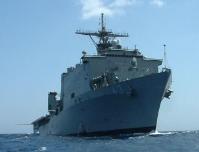Last week the U.S. Navy amphibious ship Fort McHenry quietly slipped into the harbor at U.S. Naval Station Rota, Spain, near the Strait of Gibraltar, ending a six-month deployment to the West African coast. The 16,000-ton vessel's mission, though largely unheralded, signaled a sea change in the Navy's strategy. During its October-to-April cruise, Fort McHenry visited 19 ports in 10 countries, from Liberia to Senegal, supporting scientists, aid workers and military trainers from the U.S. and allied militaries -- and delivering half a million meals to starving families. The Pentagon calls the vessel's mix of training, diplomacy, science and humanitarian assistance the "Africa Partnership Station," and aims to make it a regular affair. It's all part of Defense Secretary Robert Gates' increasing emphasis on addressing underlying societal ills before they fester into full-blown conflicts. Instead of bombing, shooting and capturing bad guys, "ultimate success or failure will increasingly depend more on shaping the behavior of others -- friends and adversaries, and most importantly, the people in between," Gates said in an April 21 speech in Alabama.
U.S. Navy Ship Pioneers New ‘Partnership Station’ Security Strategy

